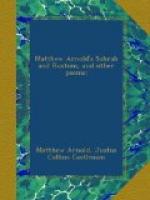=7. Hebrides.= A group of islands off the northwestern coast of Scotland.
=11. hurtling Polar lights.= A reference to the rapid, changing movements of the Aurora Borealis.
=18. Of hair that red.= According to tradition, Judas Iscariot’s hair was red.
=21. sate.= See note, l. 199, Sohrab and Rustum. (Old form of “sat,” common in poetry.)
=31. self-murder.= After betraying Christ, Judas hanged himself. See Matt, xxvii. 5 and Acts i. 18.
=38. The Leper recollect.= There is no scriptural authority for this incident.
=40. Joppa=, or Jaffa. A small maritime town of Palestine—the ancient port of Jerusalem. There is also a small village called Jaffa in Galilee, some two miles southwest of Nazareth, which may have been the place the poet had in mind.
Image the situation as presented in the first several stanzas. Why locate in the sea without a “human shore,” l. 12? Is there any especial reason for having the time Christmas night? Note the dramatic introduction of Judas. What effect did his appearance have on the saint? How was the latter reassured? Give reasons why Judas felt impelled to tell his story. Tell the story. Does he praise or belittle his act of charity? Why does he say “that chance act of good”? How was it rewarded? Explain his last expression. Was he about to say more? If so, what? What effect did Judas’s story have on Saint Brandan? Why? What is the underlying thought in the poem? Discuss the form of verse used and its appropriateness to the theme. [165]
THE FORSAKEN MERMAN
“The title of this poem inevitably brings to
mind Tennyson’s two poems, The Merman
and The Mermaid. A comparison will show
that, in this instance at least, the Oxford poet has
touched his subject not less melodiously and with
finer and deeper feeling.—Margaret will
not listen to her ’Children’s voices,
wild with pain’;—dearer to her is
the selfish desire to save her own soul than is the
light in the eyes of her little Mermaiden, dearer
than the love of the king of the sea, who yearns for
her with sorrow-laden heart. Here is there an
infinite tenderness and an infinite tragedy.”
—L.
DUPONT SYLE, From Milton to Tennyson.
Legends of this kind abound among the sea-loving Gaelic and Cymric people. Nowhere, perhaps, have they been given a more pleasing and touching expression than in Arnold’s poem. Note carefully the dramatic manner in which the pathos of the story is presented and developed.
=6. wild white horses.= Breakers, whitecaps.
=13. Margaret.= A favorite name with Arnold. See Isolation and A Dream in this volume.
=39. ranged.= See note, l. 73, The Strayed Reveller. (wander aimlessly about.)
=42. mail.= Protective covering.




